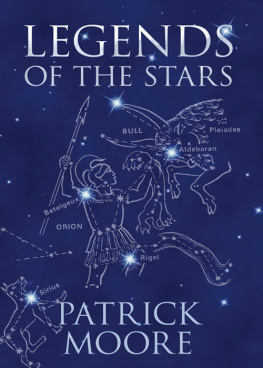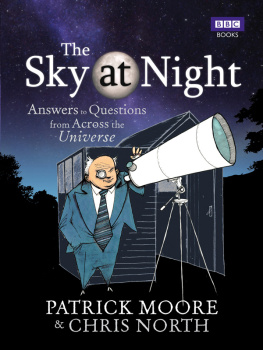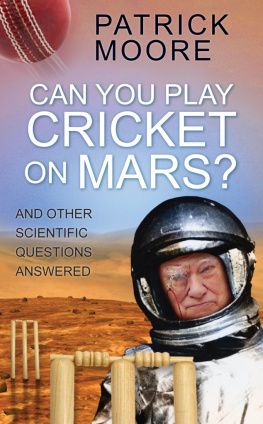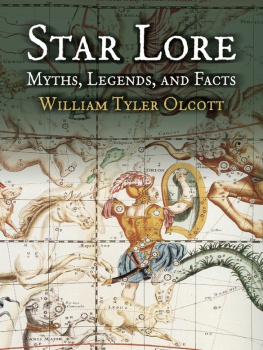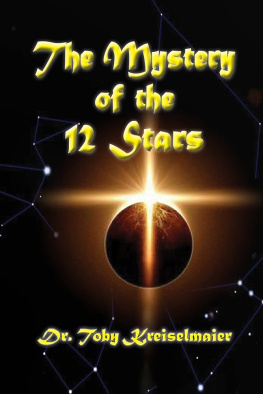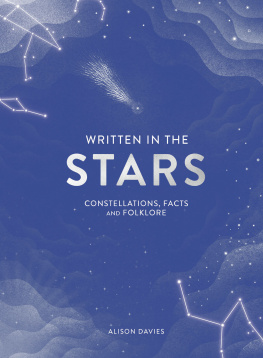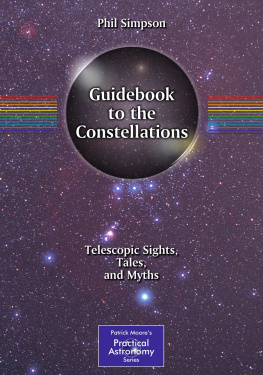Contents
TO
ELEANOR R. DENNY
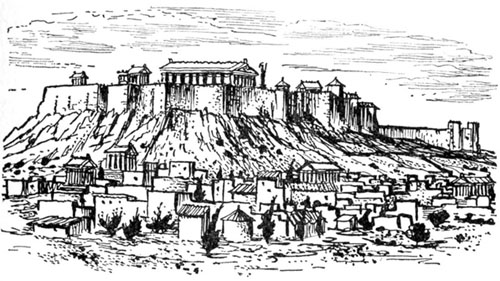
D o you like looking at pictures?
Probably you will reply yes, particularly if the pictures are well-drawn. Yet strangely enough, nearly all people over-look the most fascinating pictures of all, simply because they do not know where to look. The pictures are in the sky, formed by the patterns of stars, and you can see them on any clear night.
Let us admit that the pictures are not very clear. It takes a good deal of imagination to make a flying horse out of the star-group known to us as Pegasus, or a mans figure out of Orion. All the same, it is not hard to learn how to recognise these unusual pictures when some of the stories about them are known.
The people who first told these stories were the Greeks. Modern Greece is a small country of south-eastern Europe, with its capital at Athens; it is a fascinating place, and well worth a visit if you ever have the chance to go there, but is is not a great power in the same sense as Britain, America or Russia.
More than 2,000 years ago, things were very different. Ancient Greece was the leading country of Europe, and the Greeks were the most learned people in the whole world. They were scientists, writers, poets and athletes, as well as being brave and skilful fighters. Athens was a splendid city, and there were other Greek cities as well, such as Sparta and Thebes.
The Greeks were not Christians, and indeed there was no Christianity, since Jesus had not been born. Instead, the Greeks worshipped a large number of gods and goddesses, together with heroes and adventurers of all kinds. Each god had his (or her) own temples, and each was connected with some particular subject. For instance, Ares was the god of war, while Poseidon was the god of the sea.
Many stories were told, and were passed down first by word of mouth and then by writing. This was fortunate, since, although the glory of Greece has long since passed away, we still know the tales, and can enjoy them even though we know that they are only legends. We can do more: we can look upward on any dark night and see the pictures of the old gods and heroes, outlined by the groups of stars known to us as constellations.
The real trouble about the Greeks was that they could never agree among themselves. Two of the leading cities, Athens and Sparta, were drawn into a war which ended with the ruin of Athens and which weakened all Greece so much that things were never the same again. Then came the rise of Rome, and the gradual spread of the mighty Roman Empire, which stretched over much of Europe, and even reached as far as England. Greece was conquered, and did not become an independent country again until less than 200 years ago.
The Romans were quite unlike the Greeks. They had various gods of their own, but generally speaking they were much more interested in warfare than in the arts. The result was that they took over the Greek gods and heroes, and renamed them. Nowadays most people use the Roman names; thus the king of the gods, known to the Greeks as Zeus, has become Jupiter, while the Greek war-god Ares has had his name changed to Mars. So far as we are concerned at the moment, this does not really matter, and there is no reason why we should not use the better-known names, even though the gods themselves are Greek.
Finally, about 300 years after the birth of Jesus, the Romans became Christians, and the old gods were worshipped no more. It was not very long afterwards that the Roman Empire broke up, and the so-called Dark Ages began; but the legends were not forgotten, and never will be forgotten. They are just as interesting to us today as they were to the people of ancient times, who believed them to be true.
So let us go back 2,000 years and more, so that we can revisit those wonderful places in which the gods were all-powerful. There is much to tell, and I cannot hope to give you more than a few of the legends, but I will do my best.
P.M.
1
I cannot tell you just where the gods lived. Nobody really knows, but it was said that they dwelt in a palace in the sky, far above the mountain in Greece which we call Olympus. At any rate, they could look down upon the Earth, and they could make all manner of trouble for mankind if they chose to do so. Since many of the gods were bad-tempered, and were easily offended, it was always wise to be polite to them.
The king of the gods, and most powerful of them all, was Jupiter. He had not always been king; earlier, his father, Saturn, had ruled both sky and earth, but he had treated his children very badly, and it had been no real surprise when Jupiter had rebelled against him and taken the throne. Saturn was not killed, of course, since the gods were immortal, but he left Olympus and went to live on Earth, where he reigned happily for many years.
During the struggle, Jupiter had been helped by his two brothers, Neptune and Pluto. Since there could be only one king, the brothers had to be content with second best. Neptune took charge of the sea, while Pluto, who seems to have been a very dark, gloomy sort of person, preferred to reign over the Underworld, where the spirits of dead people went. It was a difficult task to approach the Underworld, and few people were anxious to go there until they were forced to do so. We can imagine Pluto sitting there on his throne, scowling around him and shutting himself away from all light and cheerfulness. Even his watchdog, Cerberus, was a terrifying creature with three heads, who never went to sleep and whose duty was to prevent any living man or woman from entering Plutos realm.
Meanwhile, Jupiter must have had a much happier time in Olympus. He had a beautiful wife, Juno, and he had many companions, ranging from his fierce son, Mars, the god of war, to the cheerful, mischievous Mercury, who flew about upon winged sandals and who became the messenger of the Olympians. As for Neptune, he was perfectly content to stay in the sea, and liked being in the water much better than walking around on dry land. He was apt to grumble and complain that he should have as much power as his brother, but at least he could always amuse himself by causing tremendous storms and watching sailors being tossed about in their ships.
Like almost all the gods, Neptune had several children. One of them, Orion, was particularly strong, and soon made his reputation as a hunter. However, Orions mother, Euryale, was not a goddess, and so Orion himself was not immortal. He was only a half-god, even though he had much more strength than any ordinary man.
I fear nobody and nothing, he used to boast. What animal can hope to injure me? Why, I am so tall that I can walk on the bottom of the sea without wetting my head; I can kill the fiercest lion with a single blow of my club, and I can bring down a stag by putting an arrow through its heart even when it is many miles away from me. If I chose, I could slaughter every animal on the face of the earth!
That is foolish talk, his companions would say, looking uneasy in case the Earth-goddess should hear. Remember, you are not a god, and one day you will meet your match.
But Orion would only laugh and race off to the hunt, accompanied by his favourite dog, Sirius. Fear was unknown to him; the more dangerous the chase, the better he liked it, and as time went by he became more and more sure that no living creature could hope to get the better of him.
We may suppose that Jupiter, looing down from his palace above Olympus, was not always happy about what was going on. Once, indeed, he made up his mind to interfere. Orion had been hunting in the mountains of Boeotia, a wild part of Greece, when he saw some strange figures among the trees, and dashed after them, shouting gaily and making ready with his arrows. For once he was mistaken; the figures were not those of animals, but girls the Pleiades, the seven daughters of the giant Atlas. Orion soon saw that he had been tricked by the dim light, but he ran on, anxious to catch up with the frightened girls and tell them that he meant no harm. Not unnaturally, the Pleiades became even more terrified at the huge, wild-looking figure bounding after them, and in their fear they appealed to the gods. Save us! they called. Save us, before we are caught!

